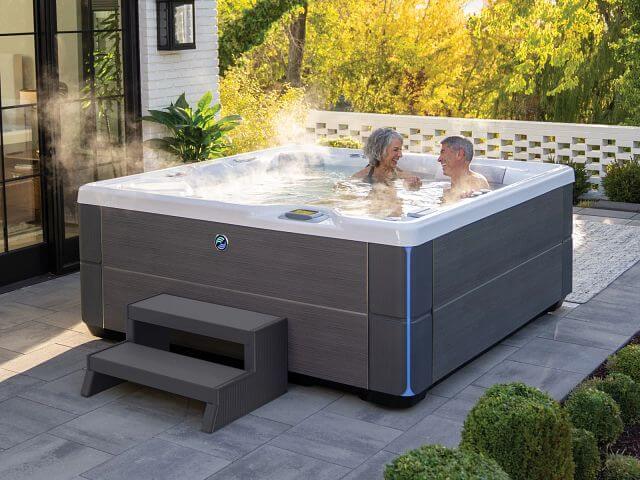
Maybe you've always dreamed of owning a hot tub, but you don't know how to make that dream a reality. Maybe your family members are eager to add a hot tub to your household, but you're concerned about how well it will fit with your lifestyle or budget. Or maybe you're already a spa owner, and you're wondering whether it's time to replace your existing model. Regardless of your particular circumstances, this buyer's guide will take you through your most pressing questions and concerns about buying or replacing a hot tub.
- Why should I buy a hot tub?
- Where should I buy a hot tub?
- What do I need to consider before buying?
- How much will my hot tub cost?
- What does it take to install my hot tub?
- How much electricity will my hot tub need?
- How do I keep my hot tub water clean?
- How much maintenance will my hot tub require?
- What should I do if my hot tub doesn't work?
- When should I consider replacing my spa?
- What are the latest innovations in hot tubs?
- What should I do with the hot tub I want to replace?
- Is it worth it to trade in my hot tub?
WHY SHOULD I BUY A HOT TUB?
Everyone's personal reasons for wanting to own a hot tub are unique, but in general, hot tubs fulfill four valuable purposes:
- Hot tubs help you relax. Modern-day living is stressful and hectic. Reclining in the luxury of warm, soothing, gently bubbling water is one of the best ways to unwind at the end of a grueling day, while in the morning, soaking in your hot tub can help you feel up to facing a full slate of new challenges. Owning a hot tub is like having your own personal masseuse on call at all times: You can use your spa's combination of heated water and powerful jets to give yourself a relaxing massage anytime you feel like it.
- Hot tubs help you entertain. Your hot tub will make you the envy of your neighborhood. If you enjoy entertaining at home, hot tubs can give you a built-in social life: Your friends and neighbors will be delighted to receive an invitation to come over and enjoy your spa. To help establish a festive atmosphere, today's high-tech hot tubs can be outfitted with optional speakers and monitors, so you can listen to music or watch a film or sporting event while soaking in your spa.
- Hot tubs can promote wellness. Soaking in a hot tub before and after exercise can prevent muscle strain and damage and promote healing. A hot tub soak before a workout can relax muscles, which might help you avoid injury; a soak afterward might help you recover from exertion faster.
- Hot tubs can temporarily alleviate the pain of some medical conditions. Soaking in hot water-otherwise known as hydrotherapy-may temporarily relieve joint and muscle aches and pains. The pain and discomfort of some medical conditions, such as arthritis or fibromyalgia, may be temporarily ameliorated by soaking in your tub. If you have a medical condition that causes you recurring pain, ask your physician if hydrotherapy might be beneficial to you.

WHERE SHOULD I BUY A HOT TUB?
Your local hot tub dealership is the best place to buy a hot tub. You do have plenty of other options-for instance, you could buy a hot tub online, or you could purchase a used hot tub from an individual or a swap meet-style website such as Craigslist-but the surest way to end up with the hot tub best suited to your particular needs is to visit your local dealer. Hot tubs are large and complex, and it helps to have someone with a deep and comprehensive knowledge of the subject on your side when you're considering a purchase. By visiting a hot tub dealership, a knowledgeable sales staff can walk you through the purchasing process and answer all your questions. Your dealer will also help you with onsite installation consultation, the installation process, and long-term care of your spa. By visiting a hot tub dealership, you can compare multiple models up close, and you'll be able to view the exact model you plan on purchasing. Many dealerships will even let you take a test soak before deciding whether a hot tub is right for you.
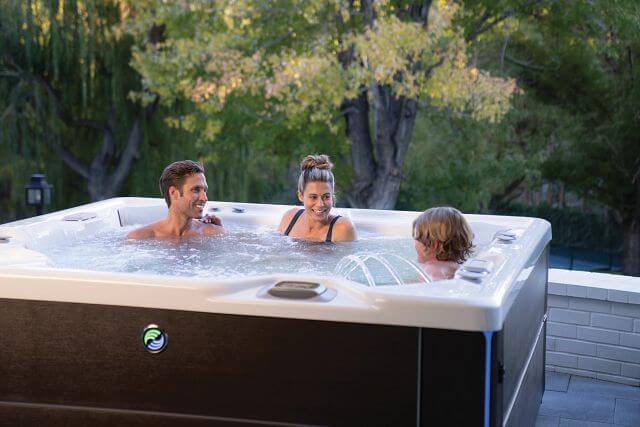
WHAT DO I NEED TO CONSIDER BEFORE BUYING?
Hot tubs come in a wide variety of sizes and styles, with a dazzling array of features. Having some idea of what's most important to you before heading to the dealership will help you and your dealer make an informed decision as to which hot tub is best for your needs:
- Your budget. What are you planning to spend upfront on a hot tub, and how much are you expecting to pay in recurring expenses, such as the ongoing costs of replacement filters and water care chemicals, to keep it running in peak condition?
- How you plan to use it. Do you need a hot tub that's roomy enough to accommodate a large family, or do you primarily expect to use it on your own?
- Where you'll put it. Due to the wide range of hot tub sizes, the amount of room you have available on your deck or in your backyard is a significant consideration when deciding which hot tub model to buy. Placement is crucial. If you have any questions as to where your new hot tub should go, your dealer may be able to visit your home and consult with you about the best possible arrangement.
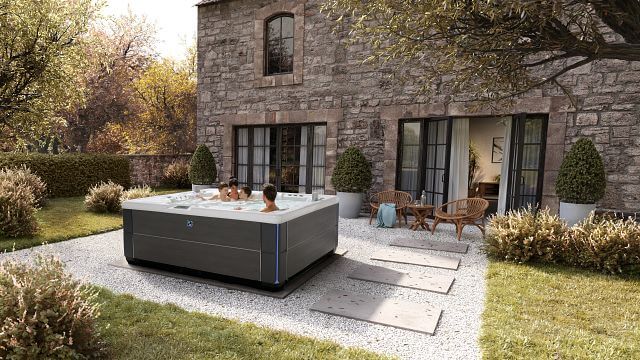
HOW MUCH WILL MY HOT TUB COST?
The total purchase price of a hot tub depends on such variables as size, features, and the quality of the manufacturing, engineering, and design. While your local dealer is the best person to give you precise pricing information, online research can give you a ballpark estimate of how much you might expect to spend on your ideal model. Hot tubs are divided into four levels of price and quality, ranked from lowest to highest: entry-level, value-priced, premium, and luxury.
- Entry-level hot tubs are generally made from molded plastic and may be plugged into a traditional electrical outlet. They're simple to use and have very few features. Expect to pay in a starting range of $4,000 and up for one of these very basic spas.
- Value-priced hot tubs generally cost between $7,000 and up. They have acrylic shells and more jets and features than their bargain-priced entry-level cousins. The quality of the craftsmanship in a value-priced spa fluctuates from brand to brand, so if this is your price point, do some research first to make sure the hot tub you have in mind will satisfy your expectations.
- Premium hot tubs feature high-quality design and engineering, complete with ergonomically-designed seats and powerful motors and jets. They're engineered to be energy-efficient and will save you money on your electric bill. Premium hot tubs start at about $11,000 and up.
- Luxury hot tubs are, as the name implies, the best money can buy. Luxury hot tubs have the best features, the best engineering, and the best design available. They generally cost in a range from $13,000 and up, though that price can go even higher.
Unless you've purchased an entry-level hot tub that can plug into a standard outlet, plan on hiring a licensed electrician to handle all the necessary electrical wiring. In addition, there will be additional recurring expenses, including routine maintenance, supplies, and energy costs.
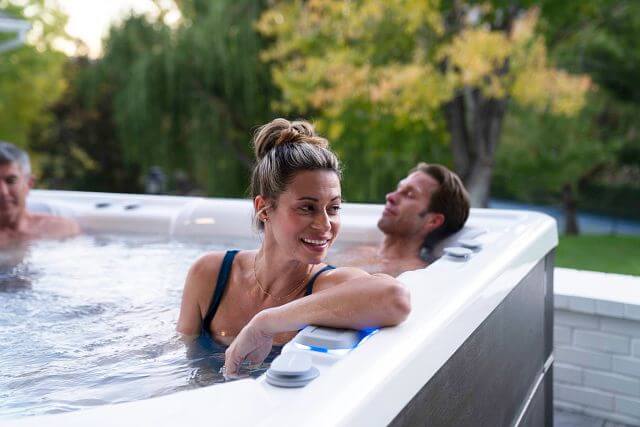
WHAT DOES IT TAKE TO INSTALL MY HOT TUB?
In order to install a hot tub in your backyard or on your deck, you'll need the following:
- A sturdy and level foundation. If you're planning on placing your hot tub on your deck, you'll need to make certain your deck is structurally sound, with a load capacity that can accommodate the significant weight of your filled spa. A building contractor or a structural engineer is the best person to tell you whether your deck is a suitable home for your hot tub. If you're going to place your spa on the ground, you will need to place it on a firm, level foundation. A thick concrete pad is a good choice, though stone, brick, wood, plastic, or even gravel may be possible foundation alternatives, depending on the weight of your tub. Ask your dealer which surface would work best for your location and your hot tub model.
- A source of electricity. As mentioned above, some inexpensively-made hot tub models can be plugged into a traditional 110-volt electrical outlet. Higher-quality hot tubs, however, will require either a 220-volt or 230-volt outlet, which must be installed by a licensed electrician.
- A source of water. You only need two items to fill your hot tub with water: a working faucet, and a garden hose long enough to reach from your faucet to your hot tub.
HOW MUCH ELECTRICITY WILL MY HOT TUB NEED?
How much your hot tub usage affects your electric bill depends upon a number of factors, including your local climate, how often you use your spa, the temperature at which you keep your water set, and the cost of electricity in your area. One of the most influential factors is the quality of your hot tub: A well-made hot tub constructed of premium materials with high-quality insulation, a durable and well-fitting cover, and an energy-efficient circulation pump will cost considerably less to heat per month than a budget model possessing few or none of these features.
While your hot tub dealer will be able to give you the most accurate information as to how much your hot tub will raise your monthly electric bill, this planning tool will give you a general idea of the cost of heating your hot tub in your location.
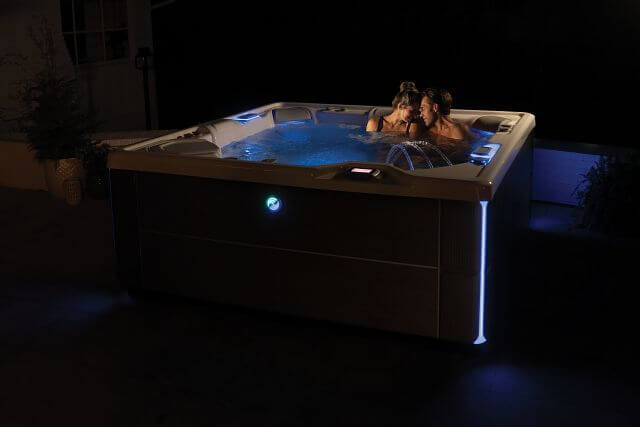
HOW DO I KEEP MY HOT TUB WATER CLEAN?
Keeping your spa water consistently clean and free from impurities is a vital part of spa ownership. As a hot tub owner, you'll have plenty of water care options to choose from. These are the most popular types of water care systems:
Traditional
Traditional water care systems are based upon using either chlorine or bromine, added manually to the tub on a weekly basis and before every use, to fight bacteria and other potential water contaminants. Traditional water care systems are inexpensive and widely available.
Ozone
Ozone-based water care systems use a combination of ozone bubbles and silver ions to purify spa water. They require fewer chemicals than traditional water care systems, which may be a big advantage for people sensitive to the potentially irritating effects of chlorine.
Salt Water
Salt water systems are designed to constantly generate salt to clean and purify your spa, resulting in water that is softer and more pleasant against your skin than water sanitized with chemicals. While salt water systems are the most expensive water care option, they require very little upkeep; with a salt water system in place, you may need to change your hot tub's water as infrequently as once a year. One example of a salt water system is Hot Spring® Spa's FreshWater®. system.
Whichever water care system you choose, it's important to follow all manufacturer instructions and the advice of your hot tub dealer to make sure your water remains constantly clean and ready for use.

HOW MUCH MAINTENANCE WILL MY HOT TUB REQUIRE?
Hot tubs do require a bit of regular maintenance to keep them in peak working condition. Your maintenance schedule will depend on your water care system and how much use your spa receives, but in general, you can expect to perform the following tasks on a regular basis:
- Clean your filters regularly-as often as once a week, depending on how much you use your spa. Replace your filters every three years or according to the manufacturer's instructions.
- Test your water quality a couple of times a week. Add more water care chemicals weekly or according to instructions.
- Clean your hot tub cabinet, cover, and any part of the shell that isn't submerged in water whenever there are signs of grime.
- Depending upon your water care system, you will probably need to drain and refill your tub every three or four months. Spa owners fortunate to have a salt water-based water care system will need to drain and refill their tubs far less often than this.

WHAT SHOULD I DO IF MY HOT TUB DOESN'T WORK?
The best action you can take as a spa owner to keep your spa in peak working condition is to follow all manufacturer and dealer instructions for hot tub use and routine maintenance. Common hot tub problems with simple solutions include tripped GFCI breakers, cloudy water, and clogged filters. If you're handy, you may be able to troubleshoot and fix simple problems on your own.
If there's something seriously wrong with your hot tub, your first course of action should be to contact your dealer. They'll be able to help you with your problem and arrange for a trained, licensed service professional to come out and help get your spa back up and running. If you've purchased a hot tub with a good warranty from a reputable dealer, any problems with your tub's operation shouldn't be a cause for concern.
WHEN SHOULD I CONSIDER REPLACING MY SPA?
A state-of-the-art hot tub can last from five to twenty years. Even a well-made but less luxurious model should remain in excellent working condition for several years. Nothing lasts forever, though, and at some point, you will want to consider replacing your spa. Over the years, your situation and your needs may have changed. If the size of your family has increased, for instance, you might want a spa that can accommodate more people. Or maybe you've finally reached the stage in your life where you feel it's time to upgrade from a value-priced hot tub to a premium or luxury model. Or maybe technology has moved beyond the limitations of your old model, and you'd like to add features or accessories that aren't compatible with your spa. Today's spas are much more energy-efficient than the models of just a few years ago; if you'd like to see a decrease in your monthly electric bill, it may be time to consider a replacement.
You are the best person to decide whether you need a new hot tub. The time to consider replacing your spa is whenever you feel like your old spa is no longer the best choice for your present needs.
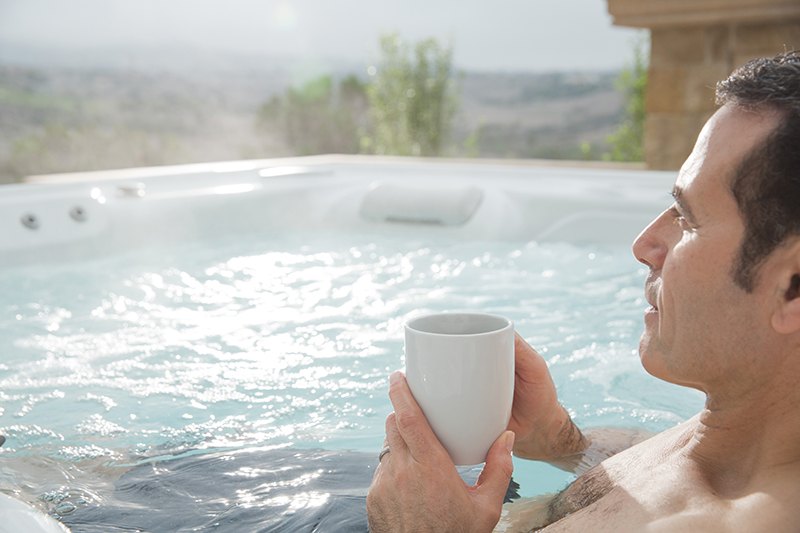
WHAT SHOULD I DO WITH THE HOT TUB I WANT TO REPLACE?
Before bringing home and installing your brand-new hot tub, you'll have to do something about the old one. Your options include the following:
- Dispose of it. You can hire a disposal company to come to your house and haul it away. If they're planning on reselling it or salvaging it for parts, they may even pay you a small amount for your old tub. Before anyone comes to pick it up, make sure your hot tub has been drained and disconnected from the electrical supply.
- Sell it. If your old hot tub is still in decent working condition, you can try to sell it or auction it off online on a site such as Craigslist or eBay. Be sure you do some careful research and calculation first-you don't want to get stuck paying exorbitant shipping fees to transport your old spa to its new owner. You can also see if a friend, neighbor, or family member would be interested in purchasing it from you.
- Trade it in. Your dealer might give you a discount on your new tub in exchange for giving them your old one. Check with your hot tub dealer to see if this would be a good option for you.
IS IT WORTH IT TO TRADE IN MY HOT TUB?
Trading in your old spa to your hot tub dealer can be a wonderful solution to the tricky problem of disposal. While you'll probably receive less in trade-in value that you could earn from selling it outright, you'll save a great deal of time, energy, and uncertainty. Trade-in value depends on your hot tub's age, condition, and model. If you're interested in upgrading to a brand-new hot tub from Hot Spring® Spas, you can find out the trade-in value of your old spa by filling out this form. Your local Hot Spring dealer may accept trade-ins from other brands, so be sure to talk to them about all your options.
WHAT ARE THE LATEST INNOVATIONS IN HOT TUBS?
Hot tubs are constantly evolving as designers and engineers come up with new innovations in technology and design. Premium and luxury hot tubs possess the most state-of-the-art features, which can include the following:
- Multi-density foam insulation is found in the highest-quality hot tubs. As the name implies, multi-density foam uses several different foam densities to comprehensively insulate your hot tub shell, bottom, and cabinet. In addition to providing the best hot tub insulation available, multi-density foam also provides extra structural support.
Buying a hot tub-or replacing the hot tub you already own-doesn't have to be a difficult process. Equipped with knowledge about the options available to you, you'll able to make an informed decision as to which hot tub is best suited to your individual needs and situation.
Hot Spring® Spas is a trusted manufacturer of high-quality premium and luxury spas, featuring state-of-the-art design and engineering to give you years of relaxation and enjoyment. To complete the first step in the process of buying a hot tub, contact your local Hot Spring dealer. You can also request a price quote or download a brochure.